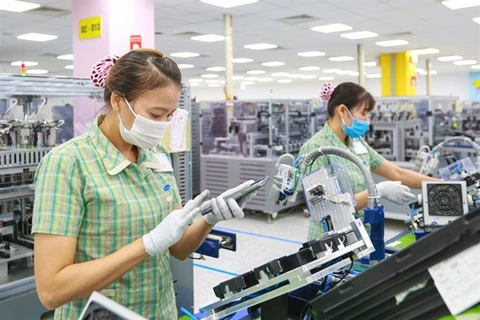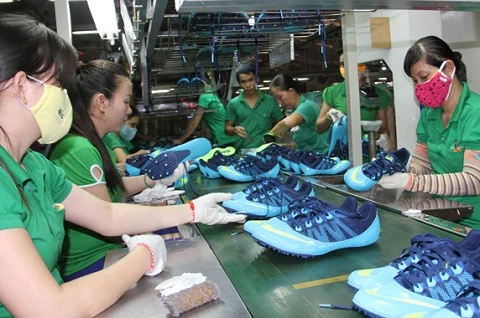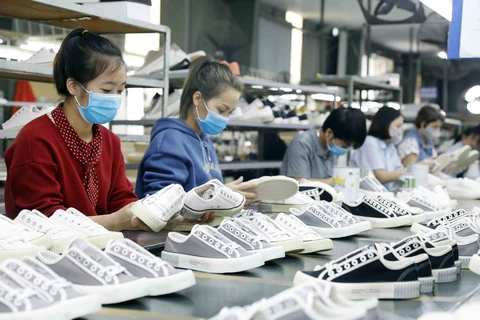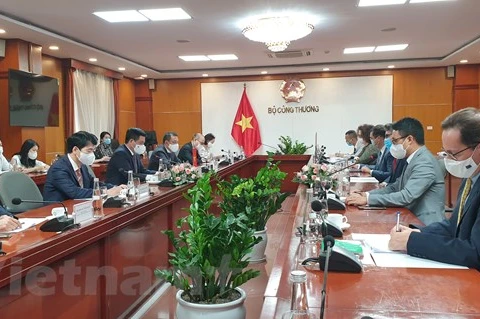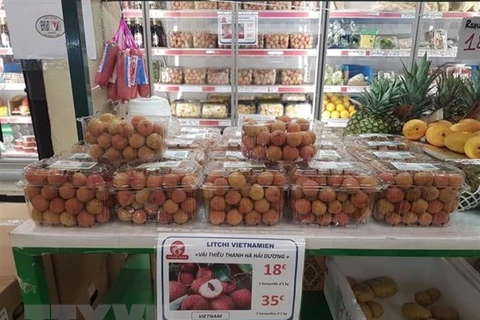Hanoi (VNA) - Vietnam's footwear exports brought home 10.4 billion USD in the first six months of 2021, a year-on-year surge of 27.8 percent.
Footwear is now among Vietnam’s most important exports as it posted the strongest growth in this period.
Notably, it was the value of traditional export markets such as North America, the EU and Asia that rose sharply.
The US is the largest market for Vietnamese-made footwear, with export turnover reaching 4.14 billion USD by the end of June. Other major markets include the EU, China, Japan and Canada.
Although the COVID-19 pandemic has had a severe impact on the production and other business activities of domestic manufacturing, especially in industrial parks, Vietnam's leather and footwear industry managed to maintain stable export growth for the first half of the year.
Phan Thi Thanh Xuan, General Secretary of the Vietnam Leather and Footwear Association (Lefaso), attributed the positive result to the sector’s proactive measures to minimise difficulties and challenges from the market.
According to the official, footwear companies have faced many difficulties in terms of production, safety and the risk of COVID-19 outbreaks.
COVID-19 prevention efforts have increased production costs for firms, especially those with workers who have tested positive. To maintain production, they have had to spend additional costs on tests and protective equipment.
Xuan said Vietnam's leather and footwear industry currently has advantages over other countries.
Aside from low labour costs and a stable political environment, Vietnam’s effective COVID-19 measures have helped local enterprises receive orders more easily from foreign partners. The number of orders increased by 10 percent in the first half of this year.
Taking full advantage of free trade agreements (FTAs), especially the EU-Vietnam Free Trade Agreement (EVFTA), has helped domestic footwear enterprises expand their export amid these difficult circumstances.
The UK – Vietnam FTA has helped Vietnam maintain its export to the UK market with an annual turnover of 200 - 300 million USD.
Xuan underlined the importance of ensuring the safety of production staff in order to complete current orders, including accelerating the vaccination rollout.
According to the official, the government is negotiating to purchase more COVID-19 vaccines. It is expected that over 70 percent of the population will be vaccinated by the end of 2021.
She also mentioned the difficulties caused by a broken supply chain.
“If a supply chain is broken, it will be difficult to restore it because establishing a supply chain requires many stages, from logistics and raw materials to financial systems,” Xuan said.
Meanwhile, it takes a long time to re-establish a supply chain, the official noted, adding that ensuring safety for production workers is the most important task now in order to ensure export growth for the industry, not only this year but also for the coming ones.
She said that domestic footwear enterprises will face labour shortage after the pandemic is put under control. Therefore, measures should be taken to actively increase labour productivity.
Xuan emphasized the need for enterprises to have a long-term technology investment strategy to update production facilities and to apply advanced management models enabling them to compete. She also stressed the need for exports to meet the mandatory requirements by major export markets such as the EU.
In addition to support packages, the Government should also create favourable conditions for enterprises, she noted.
Xuan also highlighted the importance of speeding up the COVID-19 vaccine programme for workers in the manufacturing sector, saying that it is necessary to protect workers and ensure production activities are maintained.
Workers of some leather and footwear enterprises have been vaccinated, but their number remains low, she said.
The association has proposed that the Government include workers in industrial zones into the list of priority groups for vaccination, Xuan said, stressing that this will help businesses protect their labourers and keep production stable./.

